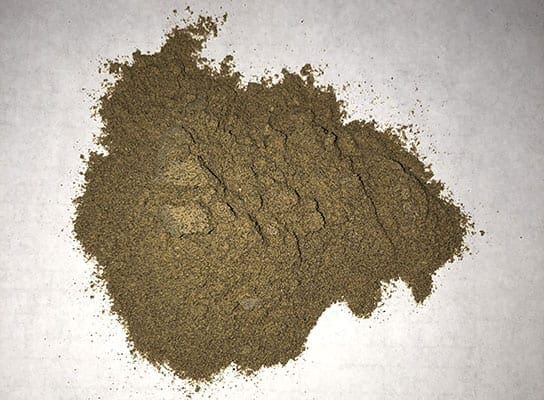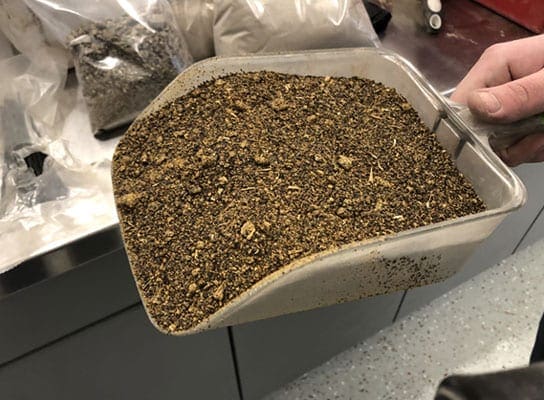Выбрать язык:
СТЭТ электростатическая сепарация процесс полностью высыхает, требование не воды или химических веществ. Сухой электростатической сепарации методы дают возможность создавать новые и более функциональных белков растений, включая рапсовый шрот или рапсовый шрот с повышенным содержанием белка для использования в качестве ценного корма для животных. This protein-enriched seed meal can be used as a non-GMO replacement for soy meal and add value to oil-crushing operators and feed producers.
Образец рапсового шрота, экстрагированного растворителем, был приобретен компанией STET для проведения опытно-промышленных испытаний. Рапса еды мелко молотые (сухой) с помощью Мельница молотковая. От начального размера частиц (D50) из 500 микрон, the canola meal was reduced to a fine particle size appropriate for the STET separator at an energy consumption of less than 60 кВт / тонна. Мелко молотые рапсового шрот продемонстрировал отличные разделение белков. Содержащие образец корма 36-38% белка (сухое вещество) was separated into a protein-enriched product in a single pass through the STET separator.

The STET tribo-electrostatic Сепаратор пояса demonstrated the capability to process finely ground canola meal to significantly upgrade the protein content, что делает его более ценным кормом для животных. The only material that was prepared prior to its introduction into the STET separator was grinding, которая была успешно выполнена с помощью Молотковая дробилка, Зрелая технология уже в широкое применение в масличных, обрабатывающая промышленность. The STET triboelectric belt separator offers many benefits for processing canola seed meal and rapeseed meal, including continuous operation, высокая скорость до подачи 15 тонн в час подача, низкое потребление энергии, Простота в эксплуатации, и высокая механическая надежность.

The name “rapeseed” comes from the Latin word “rapum,” which means turnip. Rapeseed belongs to the Brassicaceae family, which includes cabbage and mustard, sharing similar characteristics with root crops like turnips.
Rapeseed and canola are closely related but not identical. Canola is a variety of rapeseed that has been selectively bred to have lower levels of erucic acid, making it safer for consumption and more suitable for oil production.
The primary difference between a canola meal and a rapeseed meal lies in their content of erucic acid and glucosinolates. Canola meal is made from canola, which has low levels of these components, while rapeseed meal may have higher levels, affecting its suitability for some applications.
Rapeseed meal is a valuable protein source in animal diets, providing essential amino acids for livestock. It is often used as an affordable alternative to soy meal, boosting the nutritional content of feed and supporting healthy growth and productivity in animals.
Rapeseed meal contains essential nutrients like proteins, волокно, and minerals, which are beneficial for animal nutrition. Однако, traditional rapeseed meal may also contain antinutrients and toxicants such as glucosinolates and erucic acid, necessitating processing to reduce these components for safe and effective use in feed.